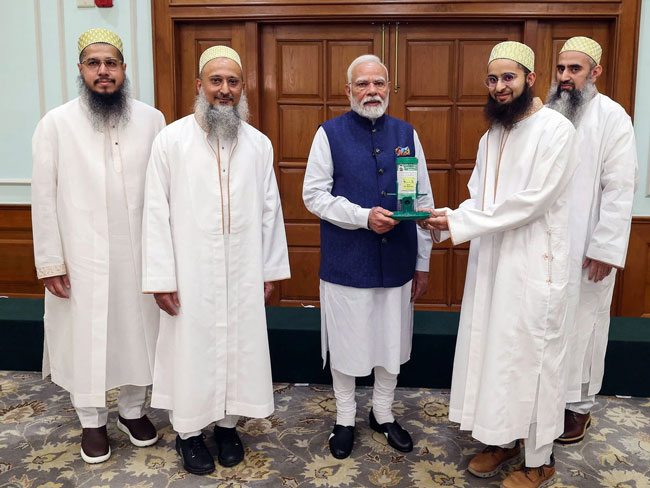Desk:While over 100 petitions challenging the amended Waqf Act are currently being heard in the Supreme Court and protests continue across the country, a section of the Muslim community has expressed gratitude towards Prime Minister Narendra Modi for the new law. On Thursday, April 17, a delegation from the Dawoodi Bohra community met PM Modi to thank him for the Waqf (Amendment) Act, which addresses several long-pending demands of the community.
Officials stated that members of the Bohra community told the Prime Minister that they had been seeking exemption from certain Waqf regulations since 1923 and trusted his vision of “Sabka Saath, Sabka Vikas, Sabka Vishwas” (Together with all, Development for all, Trust of all). Union Minister for Minority Affairs, Kiren Rijiju, was also present during the meeting. Later, PM Modi posted on X (formerly Twitter), saying, “Had a wonderful meeting with members of the Dawoodi Bohra community! We discussed several important issues during our conversation.”
Demand for Exemption Since 1923
During the meeting, one community member informed the Prime Minister that they had been seeking relief from Waqf rules since 1923. He appreciated the government for acknowledging the needs of the “minority within minorities” through the new law. Another member cited an example from 2015, when the community purchased a valuable property for a redevelopment project in Mumbai’s Bhendi Bazaar. In 2019, a person from Nashik made a claim over the land as Waqf property. The Bohra representatives thanked the government for putting an end to such practices through legal reforms.
Community Also Met JPC
The Dawoodi Bohras, a prosperous sect among Shia Muslims, were represented before the Joint Parliamentary Committee (JPC) by senior advocate Harish Salve. Based on the JPC’s recommendations, several new provisions were included in the bill, which was passed in Parliament despite strong opposition and has now become law. Meanwhile, the Supreme Court is currently hearing nearly 100 petitions challenging the constitutionality of the amended Waqf Act.
On Thursday, the apex court gave the central government seven days to respond on the validity of the Act. It also directed the Centre not to notify new Waqf properties or make appointments to the Central Waqf Council and Waqf Boards until May 5.




